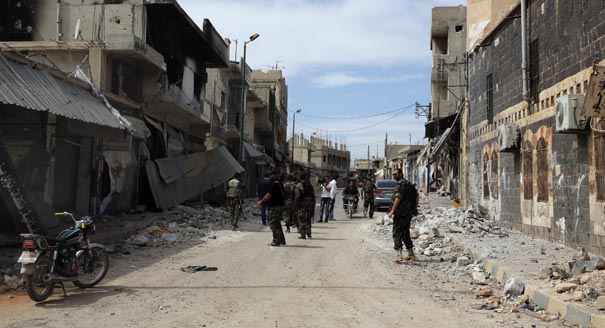The ongoing controversy over the alleged use of chemical weapons in Ghoutta, near Damascus, has again highlighted the divide between Russia and China, on the one hand, and the United States and Europe, on the other. Last year, President Barack Obama declared the use of chemical weapons as a red line in Syria, crossing which would lead to unspecified consequences. Now, Laurent Fabius, the French foreign minister, talks about responding "with force," even without a UN Security Council mandate, if it is proved that the Bashar al-Assad regime is behind the attack. The bulk of the Arab media point their fingers at the Syrian government as the likely perpetrator. The Russians, for their part, are confidently calling the whole thing a "premeditated provocation" by the radicals and extremists who are fighting Assad.
Calls have been made for a thorough and impartial investigation of the case. Conveniently, a UN mission has just arrived in Damascus, with a mandate to look into three previous cases of reported use of chemical weapons. It appears obvious that the mission's mandate needs to be expanded to include the most recent incident. The problem is that the area in question is controlled by the rebels, and the government, while vehemently denying the charge, does not appear eager to expand the UN mission's mandate. If Assad's forces used poisonous gas, the reason is obvious. If they did not, Damascus fears walking into a trap. Also, a serious investigation would require establishing a local cease-fire for the duration of the UN mission. At the moment, this does not look very likely either.
The stakes for all sides and their backers are incredibly high, and mutual trust is low or non-existent. The Syrian antagonists are engaged in a fight to the death. The outside powers, whether in the region or globally, have long made their choices. The West and most of the Arabs want to see Assad gone, and the Syria-Iran alliance broken. Russia no longer even pretends to be neutral, clearly saying that a victory of the opposition would be a triumph of extremists and terrorists. It is probable in this context that countries with substantial intelligence resources in the region, certainly Russia and the United States, would rather rely on their own information than accept an international inquiry report whose findings might point in the wrong direction.
Over the past 30 months, Syria has become a place where Moscow and Washington have been pushing hard for their very different concepts of international order. For the first time since the first Gulf War over two decades ago, Russia is actually checking U.S. power in the Middle East. The Secretary General of the Arab League Nabil Elaraby has called it a new U.S.-Russian cold war. This, of course, should not be interpreted as a simple resumption of the 20th century ideological, geopolitical, and military rivalry. However, the differences are real and deep. They range from the larger issues of the world order to assessments of the Arab Spring to the calculus in Syria itself.
Repeated U.S. efforts to make Russia change its stance on Syria and come round to the common Western position have come to nought. Conversely, Moscow's ambition to be treated by Washington as an equal partner on Syria has been ignored in DC. This does not bode well for the joint U.S.-Russian initiative on Syria announced last May and the Geneva-2 peace conference it promised. As the senior Russian and American diplomats are preparing to meet next week to discuss their lack of progress, the Syrian war has crossed the 100,000 deaths mark and continues to claim more victims.
